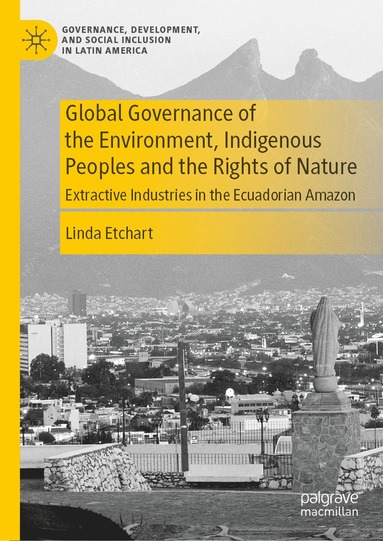
- Format
- Inbunden (Hardback)
- Språk
- Engelska
- Serie
- Governance, Development, and Social Inclusion in Latin America
- Antal sidor
- 270
- Utgivningsdatum
- 2022-01-13
- Förlag
- Springer Nature Switzerland AG
- Dimensioner
- 210 x 148 x 19 mm
- Vikt
- ISBN
- 9783030815189
- 518 g
Global Governance of the Environment, Indigenous Peoples and the Rights of Nature
Extractive Industries in the Ecuadorian Amazon
Just nu 10% rabatt på allt! Använd kod SEP25
Gäller t.o.m. 28 september 2025. Villkor
- Skickas från oss inom 7-10 vardagar.
- Fri frakt över 249 kr för privatkunder i Sverige.
Passar bra ihop
De som köpt den här boken har ofta också köpt Courage To Be Disliked av Ichiro Kishimi, Fumitake Koga (häftad).
Köp båda 2 för 1380 krKundrecensioner
Fler böcker av Linda Etchart
-
Women and Men in Partnership for Post-Conflict Reconstruction
Rawwida Baksh-Soodeen, Linda Etchart
Following a decade of armed conflict that led to the virtual collapse of the country's social, economic, legal and political fabric, the Sierra Leone National Consultation on Women and Men in Partnership for Post-Conflict Reconstruction, held in F...
Övrig information
Linda Etchart is a lecturer in Human Geography at the University of Kingston, UK. She has published work on conflict transformation, post-conflict reconstruction, women's peace movements, transnational networks, and indigenous environmental activism. She worked for an intergovernmental organization from 2001 to 2004.
Du kanske gillar
-
Redeeming 6
Chloe Walsh
Häftad -
Broken Money
Lyn Alden
Häftad -
Leadership - International Student Edition
Peter G Northouse
Paperback & Interactive eBook -
Saving 6
Chloe Walsh
Häftad


